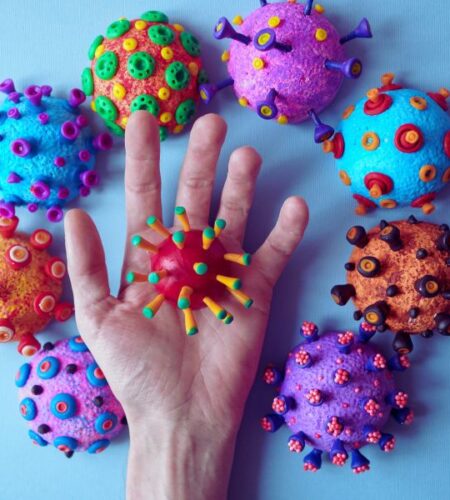The discovery of new viruses and their potential to cause pandemics has become a growing concern for scientists worldwide. Bats, known carriers of various viruses, are at the center of attention due to their crucial role in the global ecosystem. With human encroachment on their habitats increasing, the risk of new outbreaks escalates. To prevent such events, scientists are intensively studying bats, hoping to unveil valuable clues on virus prevention.
Analyzing Bat Droppings: Unveiling Insights into Pathogens
The Accra Zoo in Ghana provides a unique setting for scientists to conduct their research. At dusk, the captive colony of straw-coloured fruit bats awakens, offering scientists an opportunity to collect samples and test for different pathogens. A team of experts from the University of Ghana’s veterinary school participates in this international effort to predict and prevent future pandemics. Even amidst Ghana’s sweltering rainy season, they don full personal protective equipment (PPE) to safeguard themselves and the bats.
Lead scientist Dr. Richard Suu-ire, with years of experience studying bats, emphasizes the necessity of PPE. It serves a dual purpose: protecting researchers from potential infections within the bat enclosure and safeguarding the bats from human transmission. The intricate workings of bats’ immune systems, allowing them to carry numerous viruses without falling ill, remain a mystery. Ghana has joined hands with countries like Bangladesh and Australia in a global initiative called Bat OneHealth. This project aims to investigate how pathogens spread between species and find effective preventive measures. Given the current Covid-19 pandemic, the research primarily focuses on bat-borne coronaviruses.
Unraveling the Viral Presence: Paramyxoviruses, Coronaviruses, and More
Dr. Suu-ire and his team concentrate on testing for paramyxoviruses and coronaviruses in the bats. In humans, these viruses manifest as well-known illnesses like mumps, measles, and respiratory tract infections. The bats act as “reservoirs,” carrying the infections without succumbing to the diseases themselves. Monitoring their viral presence becomes crucial in understanding the dynamics of potential outbreaks.
While investigating bat droppings, the scientists also explore the existence of superbugs. By feeding the bats pawpaw fruit and collecting their droppings on a white tarpaulin, they can gather samples for testing. These bright orange droppings, stored in test tubes, serve as a valuable resource. The University of Ghana spearheads this pioneering research, aiming to determine the presence of antibiotic-resistant bacteria in bat feces. Dr. Suu-ire explains the significance, stating, “If there’s any resistance, we will then find out which antibiotics they are developing resistance to. In the future, we will try to isolate the resistant genes from these bacteria.”
Preserving Bat Habitats: Ecological Concerns and Human Interference
Beyond the confines of the Accra Zoo, Dr. Kofi Amponsah-Mensah undertakes crucial bat research within the university’s botanical gardens. Setting up nets, he temporarily captures bats for examination, measurement, and subsequent release into the wild. As an ecologist, Dr. Amponsah-Mensah expresses concerns about the escalating human interference in bat habitats. Ghana faces high deforestation rates, primarily driven by mining activities that destroy the vegetation crucial for bats’ natural habitats.
Dr. Amponsah-Mensah posits that blaming bats for disease outbreaks is an oversimplification. Instead, he highlights how human encroachment into bat habitats disrupts the delicate ecosystem, leading to increased contact and the subsequent emergence of diseases.
The Complexities of Bushmeat: Culture, History, and Health Risks
The conversation surrounding bats and human interaction inevitably leads to the topic of bushmeat. Markets selling various animals, including bats, become hotspots for wildlife-human interactions, posing significant risks. The central Accra bushmeat market, situated along a disused railway line, offers a glimpse into the trade. Here, individuals can find an assortment of animals, from rodent-like creatures called grass cutters to antelopes hunted in the wild.
While some experts advocate for a complete ban on such markets due to their potential contribution to virus spread, Dr. Amponsah-Mensah emphasizes the complexity of the issue. Bushmeat trade has deep roots in local cultures and histories, with many people preferring it over conventional meat options. Additionally, the trade predominantly sustains women who inherited the tradition from previous generations. Dr. Amponsah-Mensah warns that an outright ban without considering the intricate dynamics may have severe consequences.
The Noguchi Institute: Unveiling Insights in High-Security Labs
Within the secure, high-tech labs at the Noguchi Institute for Medical Research on the University of Ghana’s campus, Associate Professor of Virology, Kofi Bonney, conducts extensive analysis on bat droppings from Accra Zoo. The labs, equipped with negative air pressure systems, ensure no pathogens escape during the research process. Since the Covid-19 pandemic, Prof. Bonney and his team have witnessed an increased workload as they actively contribute to the global endeavor of early virus outbreak detection.
Prof. Bonney emphasizes the significance of collaboration between the environment, animal sector, and human sector. Establishing systems capable of detecting viruses at their early stages becomes crucial in curbing their spread. He warns that once a virus infects the human system, it continually circulates and may evolve into more severe forms. Therefore, developing effective early detection systems remains imperative.
A Future with Heightened Risks: Climate Change and Zoonotic Spillovers
As climate change progresses, experts express concerns about the rising frequency of zoonotic spillovers. The encroachment of humans and animals into each other’s habitats due to resource competition, such as water and shade, intensifies the risk. Bats, given their ability to cover vast distances during flights, already receive billions of dollars’ worth of research funding. Understanding these unique creatures better, as Ghana strives to do, becomes paramount for the overall health of the planet.
In conclusion, the research conducted by Ghanaian scientists sheds light on the intricate relationship between bats, viruses, and human health. By examining bat droppings, testing for various pathogens, and understanding the ecological challenges, they contribute significantly to global efforts in preventing future pandemics. As humanity navigates the complexities of coexistence with wildlife, comprehensive research and collaboration become crucial in safeguarding the planet’s well-being.
source: BBC.com
